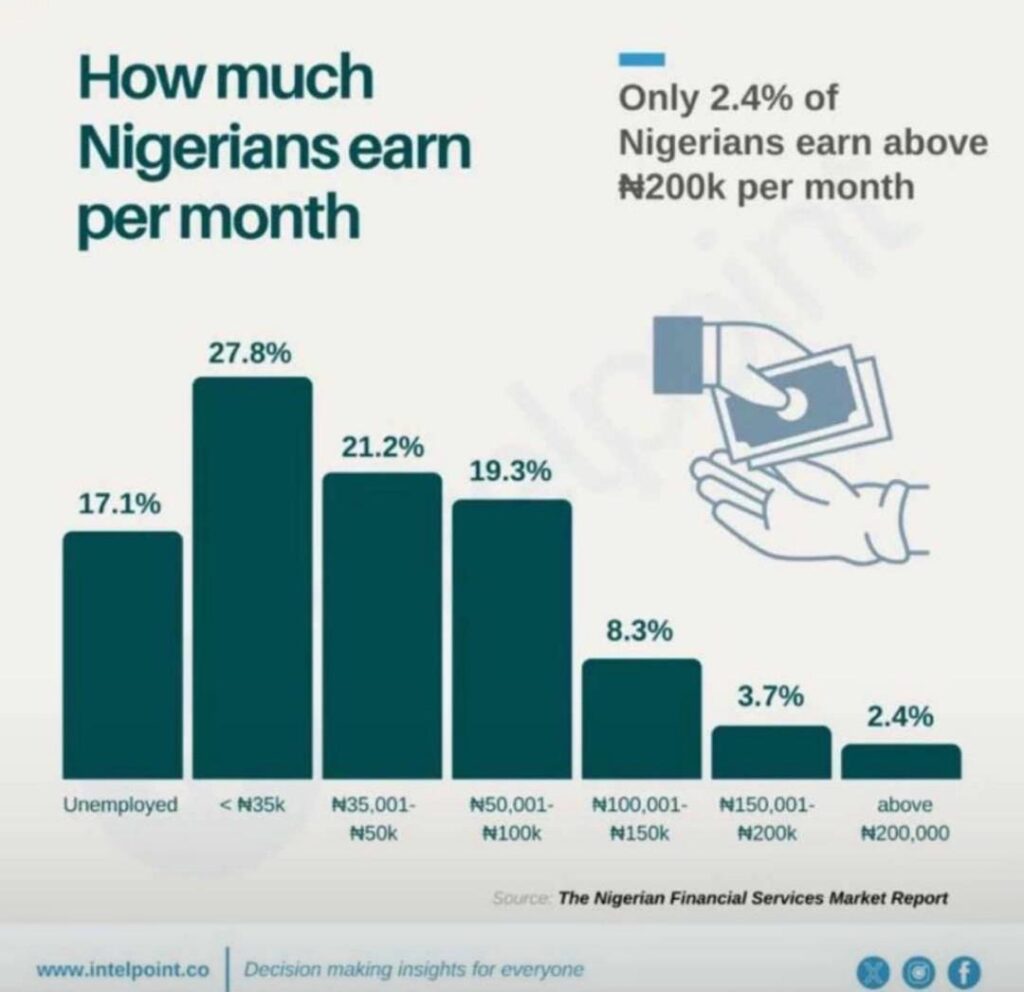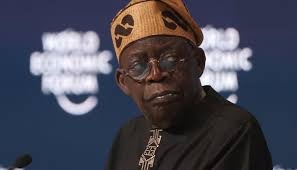By BenTV Reporter / Posted August 4, 2025
In a country of over 230 million citizens, it is sobering to consider that only a sliver of the population earns enough to cover the basic cost of daily survival. Nigeria, Africa’s most populous nation and one of its largest economies, is being quietly held up by the financial resilience of a fraction of its people and even they are now buckling under the weight.
Subscribe To The Best Team In Conservative, Business, Technology, Lifestyle And Digital News Realtime! support@ddnewsonline.com
Recent financial insight, drawn from market data and labour assessments, places the number of Nigerians earning above ₦200,000 per month, just enough to cover the average cost of food, transport, water, and housing at a mere 2.4 per cent of the population. Put differently, less than 1.1 million individuals in the entire nation have incomes that match or exceed the present cost of living.

This statistic reveals far more than a gap between rich and poor; it highlights a systemic imbalance where a disproportionately small base of earners supports a vast dependent population. With fuel at ₦900 per litre, a loaf of bread priced at ₦1,300, and a modest meal costing at least ₦1,500, the daily economic reality is unsparing. The average urban survival threshold, based on conservative estimates, now hovers around ₦160,000 per month, a figure well beyond the reach of most working Nigerians.
Labour data shows from Intel… that although Nigeria’s working-age population stands at around 126.5 million, only about 47 million are meaningfully employed. When these 47 million are juxtaposed against the 183 million people, children, the elderly, and unemployed adults, who rely on them either directly or indirectly, the ratio becomes stark. For every employed Nigerian, there are nearly four others depending on their income, food, shelter, or support.
Subscribe To The Best Team In Conservative, Business, Technology, Lifestyle And Digital News Realtime! support@ddnewsonline.com
What makes this imbalance more galling is the role and rewards of Nigeria’s political class. While millions struggle to earn even ₦50,000 a month, elected and appointed officials often live in a parallel reality. Their lives are state-sponsored to a degree that borders on feudal entitlement: chauffeured cars, domestic staff, escorts, flight allowances, security details, food stipends, and housing — all drawn from public coffers. Some spend virtually nothing of their personal income while dispensing moral lectures to citizens on sacrifice and patience.
Against this backdrop, the silent champions of Nigeria’s economy remain largely uncelebrated: the diaspora. Nigerians living abroad have consistently remitted more than $20 billion annually back home, directly supporting families, fuelling small businesses, and quietly funding education, healthcare, and housing. This flow of funds from everyday citizens abroad arguably contributes more to national development than many budgeted institutional efforts at home.
If a society is judged by how it values contribution, then Nigeria must confront some difficult truths. It cannot continue to elevate political privilege while ignoring the pressure on its working class and the sacrifices of its diaspora. It is time to reimagine accountability, and a credible path may lie in democratic innovation.
Subscribe To The Best Team In Conservative, Business, Technology, Lifestyle And Digital News Realtime! support@ddnewsonline.com
One such idea, worthy of immediate consideration, is a (Presidential) Public Citizen Score Poll, a quarterly national and (states too can adopt) rating system assessing the performance of ministers and political appointees. This scorecard, overseen by an independent civic panel and supported by citizen feedback, would reflect public trust and delivery of service. Any official scoring below a set benchmark would be dismissed within six months to one year not by presidential fiat, but by popular mandate. Mr. President will be at peace to say, that is a public rating report. It would not only decentralise executive power but restore the people’s role as custodians of leadership.
Nigeria must develop its own system not simply to mimic others, but to make governance truly responsive. In a time when fewer than 3 in 100 citizens can afford to live with dignity, the question is no longer about reform but about survival. A nation where the few are forced to carry the many cannot endure indefinitely. But with courage, scrutiny, and structural accountability, it may yet find its balance and its future.
By extension this can be applicable to other African countries that seek better leadership, inclusive governance and a patronage of her citizens abroad and as we noted nations adopting stronger internal policies.
Subscribe To The Best Team In Conservative, Business, Technology, Lifestyle And Digital News Realtime! support@ddnewsonline.com
Note: This article was first published by BenTV:
https://bentelevision.com/a-nation-carried-by-the-few-nigerias-silent-economic-burden
Opinions expressed by Columnists/Contributors is theirs and do NOT necessarily reflect the views of DDNewsonline.com



Đến với J88, bạn sẽ được trải nghiệm dịch vụ cá cược chuyên nghiệp cùng hàng ngàn sự kiện khuyến mãi độc quyền.
Khám phá thế giới giải trí trực tuyến đỉnh cao tại MM88, nơi mang đến những trải nghiệm cá cược thể thao và casino sống động.
Khám phá thế giới giải trí trực tuyến đỉnh cao tại MM88, nơi mang đến những trải nghiệm cá cược thể thao và casino sống động.
Tham gia cộng đồng game thủ tại Go88 để trải nghiệm các trò chơi bài, poker phổ biến nhất hiện nay.
iwin – nền tảng game bài đổi thưởng uy tín, nơi bạn có thể thử vận may và tận hưởng nhiều tựa game hấp
iwin – nền tảng game bài đổi thưởng uy tín, nơi bạn có thể thử vận may và tận hưởng nhiều tựa game hấp
Khám phá thế giới giải trí trực tuyến đỉnh cao tại MM88, nơi mang đến những trải nghiệm cá cược thể thao và casino sống động.
Wenn Heiligabend auf einen Sonntag fällt, wie zum Beispiel 2017, gelten natürlich
zusätzlich noch etwaige Sperrzeiten für
Sonntage, zum Beispiele während der Gottesdienste. Und manche Länder verbieten es komplett, dass Spielhallen Heiligabend geöffnet sind.
Dezember im Gegensatz zu Weihnachten kein gesetzlicher Feiertag ist, haben viele Bundesländer mit gesetzlichen Regelungen dafür
gesorgt, dass Spielhallen Heiligabend geschlossen sind.
Mit Ausnahme von Schleswig-Holstein und NRW (erst ab 18 Uhr
auf) haben Spielhallen Totensonntag geschlossen.
Touristen, die nach Rostock kommen, besuchen gerne auch
die Spielbank Rostock, die für spielerische Unterhaltung sorgt.
Mit einer sorgfältigen Auswahl an Spielen, die von klassischen Tischspielen bis hin zu den neuesten Slot-Maschinen reichen, setzt das Casino
neue Maßstäbe im Bereich der Glücksspielunterhaltung.
Casinospieler, welche in Thüringen dem gepflegten Gaming in einer Spielbank nachgehen möchten, haben keine große Auswahlmöglichkeit.
Es hat sich deutlich gezeigt, dass die „spielende Urlaubskundschaft“ nicht ausreichend ist, wenn das Fundament in der Bevölkerung
fehlt. Dieses Abkommen erlaubt den beiden Ländern, Daten über gesperrte Spielerinnen und Spieler auszutauschen, um zu verhindern, dass sie in den Casinos des jeweils anderen Landes spielen können.
References:
https://online-spielhallen.de/die-bwin-casino-mobile-app-dein-ultimativer-guide/
Upon registration and deposit, Woo Casino automatically credits bonus funds to your account—no codes required.
The mobile version offers the same features and games as the desktop site.
We maintain high standards of security, fair play, and responsible gaming to ensure a safe environment for all our players.
No downloads required – simply visit our website from
your mobile browser to access your favorite games on the
go. Enjoy seamless deposits and withdrawals with our wide range of secure payment options.
Keep the excitement going every week with our reload bonus offering
50% extra on your deposits up to $200 every Wednesday.
During live markets, Woo Casino supports fast bet placement, cashout on eligible selections, and odds formats to suit AU preferences.
You’ll find mainstream codes, fast markets, and a clean layout that works
well on mobile for in‑play action. RTP (Return to Player) is the long‑term theoretical percentage a game returns
to players over a huge number of spins. We are not responsible for any changes to the casino’s terms, bonuses or offers.
Don’t just take our word for it – jump in, spin the reels, and see why thousands of Aussies call Woo Casino online their #1 choice.
Add in the massive 21-level VIP program and it’s easy to see why Woo Casino has built
such a loyal community in Australia. Many highlight
the sheer variety of pokies and slots, with over 10,000 titles to choose
from. With dedicated customer care and round-the-clock availability, Woo Casino
online makes sure you’re never left in the dark.
At Woo Casino Australia, support is always on standby.
References:
https://blackcoin.co/casinova-casino-review/
It might offer the option of direct monthly payments
from your bank instead of manually paying each time.
Over time, they can even predict recommendations and
anticipate your needs. Chatbots process collected data and are often trained on that data using AI,
machine learning (ML), NLP, and rules defined by the developer.
They can handle common inquiries, such as order tracking or account management,
and provide 24/7 support. Using artificial intelligence can improve customer experience and satisfaction while reducing operational costs.
Train your website or other resources to get an AI model based on your business expertise.
References:
https://blackcoin.co/paris-las-vegas-hotel-casino-adults-only/
casino con paypal
References:
careerjungle.viakasi.co.za
paypal casinos online that accept
References:
koftc.com
Its like you read my mind! You appear to know so much about this, like you wrote the book in it or something. I think that you could do with some pics to drive the message home a little bit, but other than that, this is magnificent blog. A great read. I’ll certainly be back.